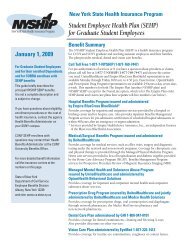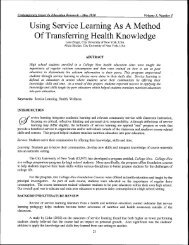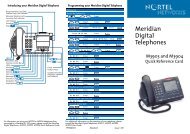Chemical Hygiene Plan - Queensborough Community College ...
Chemical Hygiene Plan - Queensborough Community College ...
Chemical Hygiene Plan - Queensborough Community College ...
You also want an ePaper? Increase the reach of your titles
YUMPU automatically turns print PDFs into web optimized ePapers that Google loves.
property damage. <strong>College</strong>s and units should verify that all users of the lab have the required<br />
safety and health training prior to allowing access to the lab and/or specialized equipment. It is<br />
the visitor’s responsibility to have or obtain the appropriate training.<br />
It is the responsibility of the Department Chairperson, P.I.s, and laboratory supervisors to<br />
restrict access of visitors and children to areas under their supervision when potential health<br />
and physical hazards exist.<br />
10.2.8 Pets in Labs<br />
In general, P.I.s and laboratory supervisors are strongly encouraged to restrict access of pets in<br />
the laboratory. Please refer to your <strong>College</strong>’s specific policy regarding building and lab access<br />
for pets.<br />
10.3 <strong>Chemical</strong> Purchasing<br />
Before ordering new chemicals, search your existing inventories and use those chemicals<br />
currently in stock. An accurate and up-to-date chemical inventory can help to minimize<br />
purchase of chemicals already on hand and can facilitate acquisition of Material Safety Data<br />
Sheets (MSDS). QCC has an institutional subscription to the Chemtracker chemical inventory<br />
system that can help facilitate maintaining a chemical inventory. If you are interested in learning<br />
more about the Chemtracker system, contact your EHS office.<br />
If it is necessary to purchase new chemicals, laboratory personnel should order only the<br />
minimum required to carry out the experiment. Avoid ordering larger quantities simply because<br />
the chemical “might be needed in the future.” Try to take advantage of chemical vendor’s “Just-<br />
In-Time” delivery rather than stockpiling chemicals in your lab. Before ordering chemicals, be<br />
sure to check QCC purchasing guidelines.<br />
Some chemical purchases may require special approval or permits, such as those chemicals that<br />
are Drug Enforcement Agency (DEA) or Alcohol, Tobacco, and Firearms (ATF) listed<br />
substances or particularly hazardous substances. There are also building and fire codes that<br />
restrict the amount of flammable materials that can be stored in any one room, floors, and<br />
buildings at a time. For more information, contact your EHS Office.<br />
10.4 Ordering New Equipment<br />
Whenever new equipment is planned for purchase and installation in laboratories, especially<br />
equipment that must be connected to the building utility services such as electric, water, or gas,<br />
laboratory personnel must first consult with Facilities Management and their EHS Office to<br />
ensure that the building can support the new piece of equipment. Lab personnel should not<br />
assume they can purchase equipment first and then expect the building to accommodate them.<br />
By preplanning and communicating well in advance with appropriate campus groups (such as<br />
Facilities Management and your EHSO), potential issues may be identified ahead of time, which<br />
in turn may help make the transition smoother.<br />
75
















